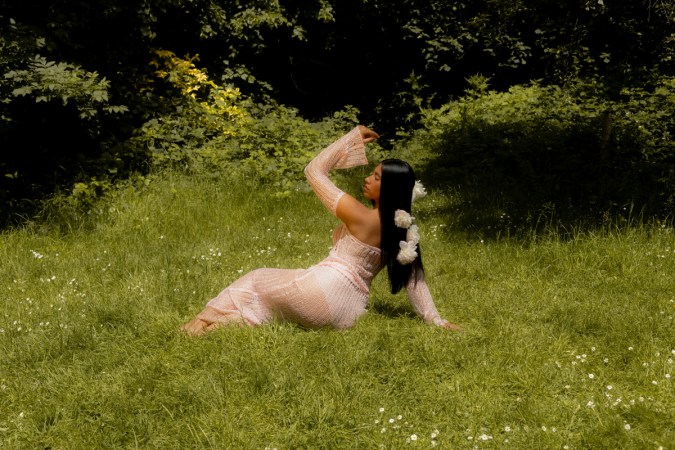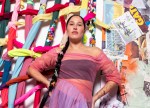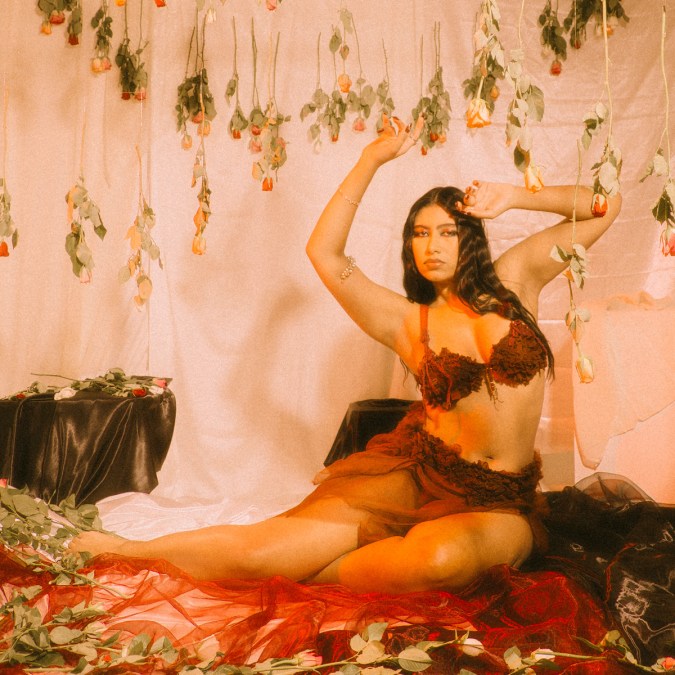“A lot of people think that when you move somewhere as far away as the U.K., you just become British, or your children just become fully British, but it was so natural for my parents to keep their culture alive,” says London-based Colombian-Cuban singer and songwriter Sophie Castillo. It ties into a lot of people’s biased perspectives of Latines abroad and is perhaps more telling of the Americas-centric attitude towards cultural assimilation because for some, embarking upon new territory means leaving tradition behind. However, Castillo deconstructs those ideas in so many ways. For starters, she’s very vocal about rejecting them altogether, and often takes to social media to hype up and represent “brown skin/indigenous features Latinas” in the indie music world as much as possible.
“I don’t look British. I look Latin American, and I think that plays such a big part in identity as well, when you just physically don’t blend in. My parents raised me to be proud of that: proud of where I’m from, to love my features, and to love how I am,” she shares.
Skimming through Castillo’s song catalog feels like holding a microscope to a giant photomontage reflective of existing in multiple worlds at once. Her music conjures up a daydreamy portal enveloped in rosy hues and a floral motif, showing love in all of its manifestations. In one moment, it is blissful and soul-cleansing, at another, it’s all-consuming and intoxicating, or pernicious and obsessive. It is the source of both euphoria and agony throughout her latest work, the Venus EP, released back in March. When she’s not penning heartsick odes to the goddess of love beside classical guitars and rattling hi-hats on “Venus,” she’s going into femme fatale enchantress mode on tracks like the more reggaeton-leaning “Asesina.”
The heavy yearning that pilots singles like “Ojos Lindos” and 2019’s “Love Me That Way” makes her admiration for the divine, starry-eyed lover girls of modern pop like Kali Uchis and Lana Del Rey obvious, but her amorous bachata-inspired ballads that swoon with salsa romántica nostalgia like “Call Me By Your Name” evince what she describes as a dual heritage, and speak to how our traditions manage to make it to every end of the globe.

Castillo was raised by a Colombian mother and a Cuban father, who both moved to London as adults in search of a better life and to support their families back in their respective homelands. The beginning of their new era in London was challenging at times, the singer says, as her mom didn’t quite realize what it would be like for her daughter to go to school in the U.K., like dealing with racism. Castillo’s parents made every attempt to remain immersed in their culture despite the big move overseas. Her parents bonded over a deep mutual love for salsa music and dancing to bugalú, both of which eventually rubbed off on a young Sophie. It wasn’t uncommon for them to blast the music of Grupo Niche, Joe Arroyo, and Fruko y sus Tesos during car rides, she shares. On “Felices Corazones,” the British-Latina singer pays homage to Colombian salsa by channeling some of those influences and sings directly to the Latina matriarchs who raised her, namely her mother and grandmother: “Siempre protegida y por eso es que yo canto/y digo/voy a ponerme a bailar para matar el dolor/voy a ponerme a cantar para sentir tu bendición.”

Through music and dance, Castillo has been able to maintain a personal connection to her Cuban-Colombian heritage and keep the culture alive, even after having spent her whole life on the other side of the world. It’s a privilege her mother didn’t have right away upon her arrival to the U.K., where she sought out traces of her homeland wherever she could.
“My mom told me that when she first moved to the U.K., they didn’t have empanadas here because they didn’t have many Latino restaurants or Colombian restaurants at the time,” Castillo says. “She was part of the first wave of people that moved to the U.K. from Latin America in the ‘70s and ‘80s, and because she couldn’t find any empanadas, she and her friends used to eat samosas. When she told me that, my heart melted a bit. I thought it was so sweet. They really just wanted to feel like a piece of home was still with them.”

I don’t look British. I look Latin American, and I think that plays such a big part in identity as well, when you just physically don’t blend in. My parents raised me to be proud of that: proud of where I’m from, to love my features and to love how I am.
Back in January, Castillo and TikTok star Patrick Vel racked up over 5 million views with a comedic video where the two bantered about their experiences growing up as British Latinos. In it, they poke fun at stereotypes and shed light on their realities as they walk through the busy streets of south London. “I’m a British Latina, of course I speak like the queen… y también hablo español,” Castillo says as she sips on a cup of tea, while Vel jokes, “I’m a British Latino, of course I don’t know why my parents came to the U.K. instead of the U.S.” The general reaction among the video’s 11,000 comments shows many TikTok users in a state of total bafflement, saying everything from “I can’t wrap my head around this lol” to “They really got that British accent whattttt.”
The video challenged many people’s perceptions of U.S.-centric ideas of Latinidad and what they have been made to believe is the norm. Vel and Castillo’s TikTok also brought plenty of Latinos across the eastern hemisphere who felt like they were living a singular experience straight to the front, from Latinas living in Liverpool and Paris to folks all the way down in Australia.

“It was really nice to hear people say, ‘I’m a Latina from here or here,’ or someone say they’re a Latino in London too,” the singer adds. “We got a lot of those kinds of comments and messages, which is really cool because it shows that everyone supports each other. I think people get used to being told there’s one standard narrative, but really Latinos can just go to other countries for a new life. We’re everywhere.”

“It doesn’t make you less Latino just because you’re not next door.”
